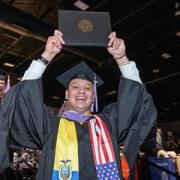Public, non-profit, community.
Request our Complete Guide to Getting Started
Master's Program at a Glance
Coursework: 11 classes (33 credits)
Courses: 3 weekends each
Start terms: Fall, Spring, Summer
Designed to fit the working adult learner's needs
Apply
The New Directions MA in Applied Political Science is a community-oriented degree, so please follow these steps to complete your application:
-
Go to the online graduate school application using the button below.
-
Under Academic Interest, select: "Master's Only," then "Political Science (MA)" and then "weekend off-campus" to apply to New Directions.
The New Directions program for your Master's Degree
Focus your degree on the intersection of government, non-profits and community with an applied Political Science MA from New Directions. The program specializes in developing informed leaders to serve within local communities. Gain skills including public policy analysis, administration, management, budgeting, and community or labor organizing.
New Directions is a non-traditional program designed for working professionals and others seeking to lead and make an impact in local government or community-based organizations.
Your New Directions courses are contextualized to deepen your understanding of political systems, as well as how race, class, gender and other inequalities shape local challenges and policy.
Your classes are composed of students from a variety of backgrounds and careers, bringing together a diversity of experiences to promote cross-sector learning in class, and modeling the partnerships and collaboration sought by local governments and non-profit or labor organizations in the community.
Your instructors are practitioners in their respective fields. They focus on practical content for you to develop relevant tools and strategies that will enhance your work or civic involvement.
Most of your courses are delivered through an in-person weekend format. Each class is three weekends, 9 am to 4 pm Saturday and Sunday, providing you flexibility to continue your career trajectory or balance other responsibilities as you work on your degree.
New Directions is an interdisciplinary and customizable program.
Current Student Profile
Alea Rodriguez is the Housing Stability Manager for Larimer County, where she leads multi-jurisdictional initiatives to strengthen affordable housing and homelessness response systems across Northern Colorado. Alea joined the New Directions program to deepen her policy expertise and sharpen the tools needed to advance housing justice at the local and state levels.
—Alea Rodriguez,
New Directions Student
You will gain skills and understanding across local government and politics, community leadership, non-profits, and policy. With this degree, you will have the skills to:
- Understand the origins of inequality and community challenges
- Identify social movements and policy innovations for addressing those challenges
- Take on meaningful roles in local or state government
- Envision how non-profit organizations can partner with government to shape or deliver programs and services
- Understand the role of community organizing in social change and impacting communities
- Budget and manage no matter which direction your career takes you
- Navigate the political forces shaping opportunities and challenges in your jurisdiction or community
You may choose to focus more of your course work, independent studies or your final project in one sector or topic that interests you. But you will take interdisciplinary courses that cross topics, including:
Local Government courses
These courses prepare you to work for or to better understand city, county, or state government. You will gain skils in government administration, politics of budget and finance, public policymaking and local politics.
Community or Labor Organizing courses
You will be prepared to lead in community or labor organizations, or to respond and partner with these grassroots movements from your role within government or other sectors. These courses engage with social movement theories, the nature of work and class, the origins and methodologies of labor unions, community organizing models and emergent worker cooperative models. Courses often focus on practical strategies for building or engaging with broad social movements.
Policy and Political Topics courses
You can take special topical courses on hot topics in public policy or political movements in our intensive weekend format. Examples may include
- The Housing Crisis: Local Solutions
- Latino Politics
- Public-private partnerships
- Gentrification
Traditional Political Science courses
You may take up to 5 courses offered through the standard Political Science MA program if you find a course applicable to your interests. Standard courses are typically offered in semester-long weekday evening or online formats.
An MA in Applied Political Science through the New Directions program helps you move your career forward.
Alumni Highlight
A 2025 Graduate, Jem Aspen, is using her New Directions MA to expand economic opportunity at the non-profit Rocky Mountain Employee Ownership Center. Her new career, advancing worker-owned cooperatives, builds directly on the passion and expertise she cultivated during her New Directions graduate studies for serving the LGBTQIA+ community through cooperative housing models. She's using skills developed through her coursework and from serving as the New Directions graduate assistant to improve her community.
—Jem Aspen, 2025
New Directions Alumni
Some of our alumni have gone on to:
State and local government
- City manager
- County managerd
- Department director
- Business analyst
- City council aide
- Paralegal
Non-profit
- Program director
- Senior manager
- Educator
Higher education
- Researcher
- Community college professor
- Regent
Private business
- Owner
- CEO
- Founder
- Director
The MA in Applied Political Science
Weekend Program Format
New Directions courses are offered through a weekend intensive format. Each course is taught over three weekends from 9 am to 4 pm on Saturdays and Sundays. Courses are spaced so students may take one or multiple courses in a term. The weekend format provides you the flexibility you need as a working professional or to balance other responsibilities.
You will complete 33 graduate credit hours to receive your master's degree. This includes 2 required courses in Community Organizing and Development and Research, several options for completing your final 3-credit capstone project or experience, and an additional 24 credit hours of electives. Course topics may include:
- City Policymaking
- Politics of the Budgetary Process
- Housing Crisis: Local Solutions
- Local Government and Administration
- Worker Cooperatives
- Labor Law and Collective Bargaining
- Non-profits and Social Change
- Customized courses on timely and emerging topics
Your elective courses will provide you interdisciplinary opportunities to explore public, non-profit, and community or labor leadership. You will have 2 to 3 elective courses to choose from each spring and fall semester, and at least one class will be offered in the summer, typically in a weekly remote format to accomodate summer travel.
You may also create your own independent study, on your own or with a civic partner, or take an internship for credit toward your degree.
You may also take a few graduate courses in our standard Political Science program, which are typically offered on weekday evenings or on-line but not in the weekend format.
Your Culminating Degree Capstone
New Directions offers you several ways to demonstrate your proficiency and complete your degree. Each of the following options represents 3 credits of work and a final presentation with a faculty chair or committee.
- Master's Project, typically a written paper or product, but creative alternatives are allowed
- Internship, with a reflection paper connecting your experience to your coursework
- Extra Course, no paper required but you will present a portfolio of papers you have written throughout your coursework
Many MA students complete Master's Projects. The following are just a few of the examples you can consider:
- a scholarly paper
- conducting research or developing a plan for a government or community client
- policy analysis
- model legislation
- a policy or organizing toolkit
- a film
Your Master's Project is an opportunity to develop expertise in your selected area of study, with the guidance and expertise of a team of faculty advisors.
Full-time students may finish in as little as 2 to 2.5 years. However, students who work or have other responsibilities may take only 1 class per term or take summers off, resulting in completion in 3 to 5 years. The program is individualized.
Learning Objectives
Alumni Highlight
A 2016 graduate from New Directions, Nolbert Chavez served four terms in the Colorado House of Representatives, owned a successful government affairs and strategic planning consulting firm, and is currently serving as the CU Regent for the 7th Congressional District. He serves in the CU Denver administration, on numerous community boards and recently completed his PhD in Urban Planning. To learn more, please visit the alumni page.
—Nolbert Chavez, 2016
New Directions Alumni
1. Knowledge of the role of political action and political systems in shaping human cultures and socio-economic patterns, including:
- Knowledge of the American Political System
- Knowledge of political systems across history and world region
- Knowledge of theoretical foundations of political systems and political values
- Ability to compare political systems in their differing abilities to deliver public welfare
- Knowledge of the processes, institutions and actors involved in globalization
This knowledge will be focused by engagement with the fundamental questions of political life, both contemporary and enduring. Students will place themselves in conversation with multiple political and moral perspectives, including those outside of the traditional Western canon, by developing their own positions and by seeing how their positions build from and contribute to these perspectives.
2. Intellectual and Practical Skills, including:
- Inquiry and analysis
- Critical thinking
- Creative thinking
- Written communication
- Oral communication
- Reading Ability
- Quantitative literacy
- Information literacy
- Teamwork
- Problem solving
These skills will be applied to evaluate conflicting arguments, assemble and present empirical evidence using appropriate methods of research and data analysis, make reasoned conclusions from the evidence available, and prepare professional and persuasive presentations regarding those conclusions.
3. Personal and Social Responsibility, including:
- Civic knowledge and engagement—local and global
- Intercultural knowledge and competence
- Ethical reasoning and action
- Foundations and skills for lifelong learning
This responsibility will be anchored through active involvement with diverse communities and real-world challenges (including internships, service-learning and other experiential learning opportunities) that allow students to reflect on the relationship between theory, political practice and potential career paths. In these experiences, students will apply critical thinking skills to solve collective problems in a manner that improves the public good.
4. Integrative/Holistic and Applied Learning, including:
- Completion of department course work across a range of political science subfields
- Application of insights from other programs of study to enhance their political understanding and practical skills
This learning will be demonstrated through the application of integrative and holistic knowledge and skills to foster purposeful civic commitments, to produce effective oral and written presentations, and to develop practical skills for continual personal and professional development.
Assessing Learning Objectives
The Department of Political Science conducts annual assessments of student progress towards departmental learning objectives. Assessments are typically targeted towards different categories of courses in different years. For example, one year the department might assess all “experiential learning” courses, while another year we might assess our “core curriculum” courses, and in another year we might assess our study abroad courses. In some years, the department conducts a broader assessment of department-wide progress towards learning objectives across many different courses.
The specific strategies typically utilized in our annual assessment process are a mixture of the following:
- Direct Assessment of Course-Based Learning. The Political Science Department reviews student exams, written papers, oral presentations and final portfolios for targeted classes during its assessment
- Student Self-Assessment Surveys. The Political Science Department often embeds a student self-assessment survey into its assessment process. The survey collects students’ self-assessment of their own intellectual growth, knowledge gained, and level of change in political aptitudes, skills, attitudes and engagement level during their time in our classes and department. Informal assessments include a review of student FCQ comments and other informal verbal feedback from students.
- Master’s Capstone Assessment. The Political Science Department periodically assembles a team of faculty to review all master’s theses or projects submitted for oral defense in an academic year, to conduct an assessment of progress towards learning objectives among our master’s students.
Tuition and Costs
Tuition is around $1,600 per 3-credit course, and you can pace your classes to fit your budget. This tuition makes New Directions one of the most affordable in-person graduate degrees available.
* Please note that New Directions courses are considered extended studies and not eligible for the University of Colorado Tuition Assistance Benefit (TAB).
Financial Aid
Scholarships
We know you may be concerned about how to pay for graduate school. So New Directions is pleased to offer several competitive scholarships that cover a portion of the cost of attending for new, incoming master's students. Award amounts vary based on available funds and student qualifications. Decisions will be made concurrent with a student's application to the program. Prospective students who believe they may qualify for one of the following scholarships should reach out to the director for a meeting and directions on how to apply:
Federal Financial Aid
Master's students who complete a FAFSA may be eligible for loans and/or work study based on need as long as they are enrolled in 3 or more credits, which is considered half time for graduate students.
All financial aid eligibility is based on the total cost of attendance, which includes direct expenses (tuition and fees, as well as on-campus housing and dining) and indirect expenses (off-campus housing and food, transportation, personal expenses, books and supplies, and loan fees). Eligible students can receive total financial aid awards up to the full cost of attendance, inclusive of both of these categories. There are individual limits on specific types of financial aid, such as the unsubsidized loan, and eligibility based on need as determined by the FAFSA, but the combined total is only limited by the cost of attendance.
Loans:
- Federal Direct Unsubsidized loan: amounts up to $20,500 each year This is the most widely used loan for graduate students. To qualify, you must fill out a Free Application for Federal Student Aid (FAFSA).
- Federal Direct Graduate PLUS loan: amounts up to the total cost of attendance.
Students will also need to complete a credit check through the Department of Education for the PLUS loan. Learn more about PLUS loans.
- Private education loans: amounts up to the total cost of attendance.
Work Study:
Some students may be eligible for work study by completing a FAFSA. Learn more about the university's work study policies.
Tuition Reimbursement
Some employers provide tuition reimbursement. For example, both the State of Colorado and the City and County of Denver allow up to $2000 of reimbursement per year for certain employees, pending funding availability and policy eligibility. Check with your employer, we're happy to provide any documentation required. Please note that because we are extended studies, the University of Colorado tuition assistance benefit (TAB) cannot be used to pay for New Directions classes.
Fellowship opportunities
Either concurrently with an aplication to New Directions early in the calendar year, or early each year you are enrolled, you will have the opportunity to apply for a competitive two-year fellowship sponsored by Colorado's Department of Local Affairs.
This Best and Brightest Fellowship program places masters students from qualified programs like New Directions with local governments in small or rural communities across Colorado. The program may place fellows into existing roles such as assistant town manager or policy analyst, or to complete one-time projects like creating a sustainability plan.
You will apply by around March 1 for a summer start date with your local government if you are selected.
Admission Requirements
New Directions is designed to support non-traditional graduate students, but we also welcome those interested in attending full-time. In our program you'll study alongside learners of all ages and backgrounds interested in advancing as local leaders.
Applicants must have completed an undergraduate degree at an accredited United States college or an equivalent in another country by the start of the program. The program welcomes applications from students in the final year of their undergraduate degrees. Current University of Colorado Denver Political Science undergraduates can pursue a "4+1" degree where you begin taking graduate courses that count toward both your undergraduate and a future graduate degree in your junior or senior year.
No standardized tests required! No course prerequisites, specific GPA, or particular work experience required for admission. The admissions committee considers your educational, life and work experience and goals. We focus on your readiness as an individual.
To review application materials required, visit the "How to Apply" tab below.
Veteran and Military Education Benefit Students
We have many students that use military education benefits at CU Denver. Students planning to use military education benefits will work closely with the program staff and the Veteran and Military Student Services Office throughout our program. We are happy to discuss specifics of using military benefits for this program.
Applying to the New Directions program.
Application Checklist
Online application
Official transcripts from each college or university attended
Two letters of recommendation-academic and or professional
Statement of Purpose
Writing Sample
Application Fee
Admissions operate on a rolling basis, meaning decisions are made as applications are completed. See the "Application Deadlines" tab below for more information. New Directions participates in the annual Colorado Free Application Days early each October where you can apply for free. Contact the director if you need a waiver of your application fee any other time of year.
The New Directions MA in Applied Political Science is a community-oriented degree, so please follow these steps to complete your application.
-
Go to the online graduate school application using the button below.
-
Under Academic Interest, select: "Master's Only," then "Political Science (MA)" and then "weekend off-campus" to apply to New Directions.
Application Deadlines
New Directions takes a flexible and personalized approach to applications to meet you where you're at. We encourage potential students to meet with the director prior to submitting your application, but it's not required. Any scholarship decisions are made concurrent with your application. The following admissions dates are a general guide for when you should aim to apply in order to start in that term, but the program operates on rolling admissions, so we will review your application whenever it is received.
Fall
- Priority August 1
Spring
- Priority January 2
Summer
- Priority May 1
If you miss the final application cutoff date for an upcoming term but would like to take a course that has not yet begun, you may register for classes as "non-degree" while your application to the full MA degree is pending. Please contact the director for details on this option.






